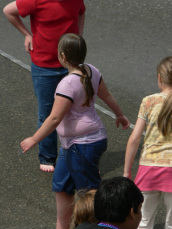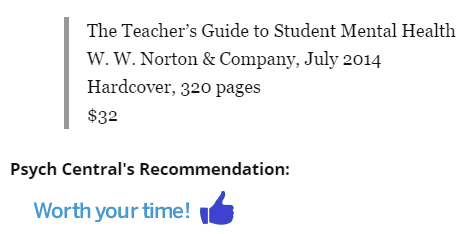Teachers need two kinds of information about children's mental health issues. First, they need to have an understanding of the different mental health disorders that affect children and adolescents and to understand how these disorders manifest within the classroom environment. Secondly, they need to know and utilize teaching methods that have been shown to be effective for individuals who have emotional and/or behavioral problems. This paper, in slide format, explains clear actions educators can take to improve the experience of students with emotional and behavioral problems.
|
I recently added a new presentation to the website, Adopting Evidence-Based Teaching Methods for Students who have Emotional/Behavioral Problems. This is a PDF of a talk I first presented at the Education Minnesota 2014 conference. It provides an overview of teaching methods that result in improved academic performance and reduced behavioral difficulties.
Teachers need two kinds of information about children's mental health issues. First, they need to have an understanding of the different mental health disorders that affect children and adolescents and to understand how these disorders manifest within the classroom environment. Secondly, they need to know and utilize teaching methods that have been shown to be effective for individuals who have emotional and/or behavioral problems. This paper, in slide format, explains clear actions educators can take to improve the experience of students with emotional and behavioral problems.
1 Comment
 We know that America's growing obesity problem is affecting children and teenagers physically, but did you know that pediatric obesity is correlated to serious mental health issues? As an M.D., I think it's important to look at the whole student. That's why I have frequently addressed the issues of health, nutrition, exercise, environmental toxins and other factors in presentations to educators and school administrators. I recently added 2 slide presentations to my Articles and Papers section that are focused on nutrition, lifestyle and student mental health. If you're interested in learning how diet, nutrition, sleep, and exercise could be affecting your students emotionally and psychologically, feel free to browse these documents. Photo: "Variation in body fat 12577" by Walter Siegmund - Own work. Licensed under Creative Commons Attribution 2.5 via Wikimedia Commons - http://commons.wikimedia.org/wiki/File:Variation_in_body_fat_12577.JPG#mediaviewer/File:Variation_in_body_fat_12577.JPG
 I'm excited to announce that my latest book, "The Teacher's Guide to Student Mental Health," is now available for pre-ordering on Amazon. I've spent quite a bit of time developing this information for educators who want to learn more about working with children or adolescents who have mental health issues. The blurb from Amazon reads, "From ADHD to schizophrenia and everything in between, what teachers need to know about their students’ mental health.” "Teachers are often the first to notice kids’ mental health issues. This book, the first of its kind, gives teachers an understanding of everything from depression and anxiety to OCD and trauma. Including a section on working with mental health professionals, this book will help teachers to help their students." The book is available to purchase on Amazon and will be in stores in July, 2014. I hope educators everywhere will find it a helpful resource for student mental health information and I look forward to your comments and questions! |
AuthorDr. William Dikel is a board certified child, adolescent and adult psychiatrist who provides a wide variety of psychiatric consultation services. He is based in Minneapolis, Minnesota, and provides consultation state-wide and nationally. Archives
July 2021
Categories
All
|

 RSS Feed
RSS Feed